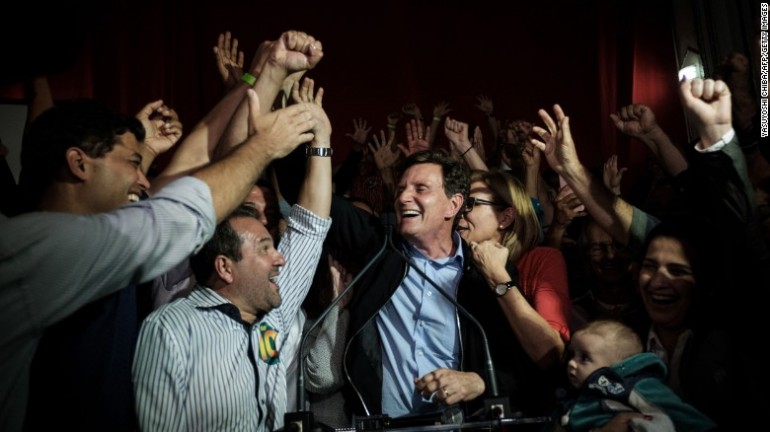Sponsored Listings:
Rio de Janeiro, the city of sunshine and samba, elected a former evangelical bishop mayor in a municipal election that signals Brazil’s politics are shifting right after 13 years of national leftist rule.
Marcelo Crivella, a conservative senator who is affiliated with an influential megachurch, won a runoff election Sunday with nearly 60% of the vote, beating runner-up Marcelo Freixo, a socialist state deputy and former history teacher, by nearly 20 percentage points.
“We’re currently witnessing a fragmentation and reconfirmation of politics in Brazil,” said Michael Mohallem, a law and political sciences professor at the Getulio Vargas Foundation.
Sunday’s election was a battle of the extremes: on the right Crivella’s conservative Brazilian Republican Party, on the left Brazil’s Socialist Party. None of the center-leaning parties that had traditionally been elected to power in the country’s second-largest city made it past the first round of voting in early October.
This comes just a few months after Rio hosted the 2016 Summer Olympics while in a state of calamity and after congress impeached former center-left President Dilma Rousseff.
Brazil’s economic crisis deepens
“With the recent scandals, we are seeing an opening for smaller parties to dispute that space,” Mohallem said. “It’s difficult to say if this is a reaction to the impeachment or if it’s part of the phenomenon of change that comes after having one party in power for 12½ years.”
Evangelical vote grows

Crivella, who has categorized homosexuality as a sin in the past and called it a “terrible ail” in his book “Evangelizing Africa¸” is the nephew of the man who founded the Universal Church of the Kingdom of God.
Crivella attempted to distance himself from the church during his mayoral campaign, and has vowed to remain independent.
But his affiliation is nonetheless raising alarm among many of the city’s social activists, including Claudio Nascimento, the coordinator of the state-backed “Rio Without Homophobia” group.
“We are very concerned about the results of the municipal elections,” Nascimento said. “We need a guarantee that the new mayor is going to govern for all and not just for one religion and respect the separation of church and state.”
Brazil’s evangelicals are known for their conservative values that often clash with the country’s more inclusive laws, particularly on LGBT rights and same-sex marriage, which was legalized in 2013.
Although Brazil is still the world’s largest Catholic country, the number of evangelical worshipers has been on the rise and currently represent one-fifth of the population.
Brazil looks to 2018 presidential election
Across Brazil, the Worker’s Party suffered a major blow in more than a dozen cities on Sunday, losing 60% of its control in the country’s municipalities.
“The PMDB had been a very strong political force in Rio de Janeiro for decades because they had a strong alliance with the PT and the federal government,” Mohallem said of the center-right Brazilian Democratic Movement Party. “Now it appears they’ve left a vacuum of power that seems to be leaning towards the right.”

While the Workers Party lost its political clout nationally, the PMDB did not. The PMDB had the second-most number of people elected. It did lose in Rio, where it had dominated on the state and municipal levels for decades.
Earlier this month, the country’s business capital of Sao Paulo booted Workers Party Mayor Fernando Haddad in favor of billionaire businessman Joao Doria.
For Brazil, the main catalyst for change may be seen in the 2018 presidential elections, which could potentially see the re-election of former President Luiz Inacio Lula da Silva — the popular union leader who was first elected in 2002 and whose party is at the center of a federal corruption probe — or new shift to the right on the national stage.
Sоurсe: edition.cnn.com










